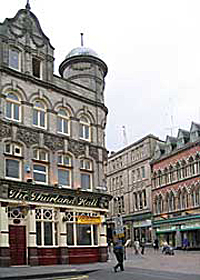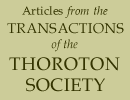< Previous | Contents | Next >
Pelham Street
 The Thurland Hall public house on the corner of Thurland Street
and Pelham Street (A Nicholson, 2004).
The Thurland Hall public house on the corner of Thurland Street
and Pelham Street (A Nicholson, 2004).Pelham Street is a modern name for a very ancient thoroughfare. In olden days it was called Gridlesmith Gate or sometimes Girdlesmith Gate. The derivation of this name is rather obscure, but I think that it probably means Great Smith Gate. The name Smith does not necessarily mean a worker in metal although in modern times it has come to have that particular meaning, but anciently the term of Smith was applied to any artificer, so that Great Smith Gate possibly means that at some time or other this was the chief manufacturing district of Nottingham. The name was dropped about 1800 possibly because it was frequently confused with Bridlesmith Gate and the name of Pelham Street was adopted out of compliment to the Duke of Newcastle.
Like all other Nottingham streets it was extremely narrow, but in 1844 it was widened at the bottom and up to about where Thurland Street now is, but it remained a bottle neck at the top for ten years longer, and it was not until 1854 that this inconvenience was rectified and the street was widened to its present width at its entrance to Carlton Street. There is not much of interest remaining in the modern street for the property in the centre of the town was too valuable to remain unmodernised so that the houses and shops abutting this street are mostly of recent construction, but although there is little tangible remaining of the great past of this street there are many memories still clinging to it. At the south-east corner stood the small house which was the town house of the Byron family, and it was here that Lady Byron, the last of that historic family to live in Nottingham, died about 1820.
Just opposite this point there is a curious break in the footway on the other side of the road, the house suddenly projecting a couple of feet. This break has an interesting history for in 1674 George Gregory, the representative of the well known Gregory family, built for himself a town mansion fronting upon Carlton Street, and quite unconcernedly he filched a couple of feet from the public thoroughfare and advanced his forecourt so that it projected into the already constricted entrance from Gridlesmith Gate into Carlton Street. It is a curious comment upon the times that such was the power of the family nobody seemed to have the courage, even if they had the inclination, to protest against this outrage.
The "Blackamore's Head" as we have seen extended up the south side of Pelham Street and had courtyard gates opposite where is now Thurland Street, but that inn has completely disappeared as have also several other interesting inns which in times past were situated in this street. It was from the "Durham Ox" which was in Gridlesmith Gate that the post-gigs started to Lincoln and Newark and it was at the "Sun Inn," kept by Mr. Carter hereabouts, that in 1792 the Democrats established their headquarters. These Democrats were by no means popular in their day and generation for their avowed sympathies with the French Revolution and the American Independence led them into constant conflict with their fellow-countrymen which was reflected in Nottingham by a threat to burn down Mr. Carter's premises.
Another old inn which has disappeared from Pelham Street is the "Red Lion" which afterwards became known as "The Old Ship." In 1763 a very curious association was formed within its walls, for at a meeting of the aristocracy and gentry of the neighbourhood it was decided to form an association for the protection of fighting cocks. This association was the outcome of a strange outrage which had recently taken place at the "White Lion" in Clumber Street. That inn was one of the best known cocking centres in the whole of the Midlands and a great match had been arranged between cocks representing London and those representing Nottingham. Huge sums had been staked on the success of one side or the other and a great gathering of aristocracy and sportsmen was expected. However, just before the great match somebody gained access to the walks attached to the "White Lion" where the cocks were being trained and succeeded in poisoning so many of them that the match had to be declared off, and although £50, which was a huge sum in those days probably equal to £500 nowadays, was offered for information as to the perpetrator of this deed, no information was ever obtained.
